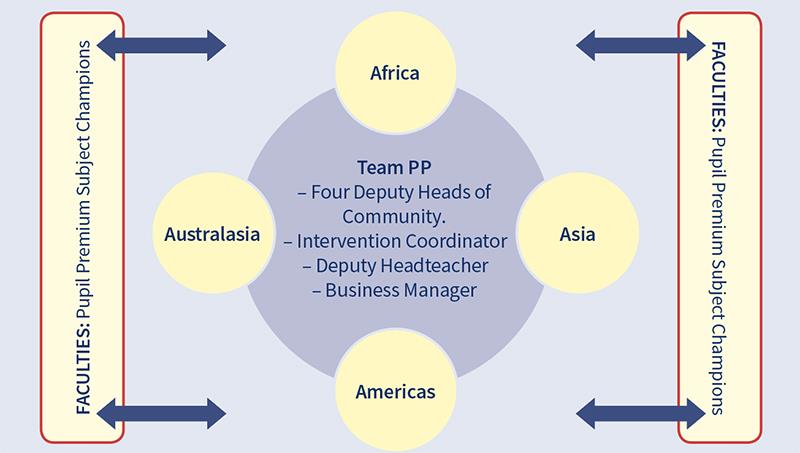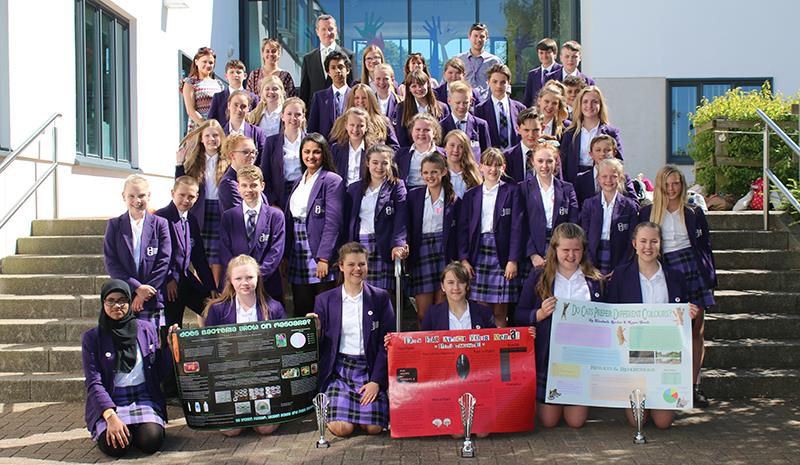
Oriel High School in Crawley, West Sussex, opened in September 2004 after a campaign from parents and the community. It currently has just under 1,400 students on its 11 to 18 roll, 13 per cent of whom are Pupil Premium funded; 25 per cent of its 11 to 16 students were identified as Catch-Up Premium students on entry in year 7 in maths and/or English.
Cohort, context and research
Engaging with the demographics of our Pupil Premium cohort has become key to understanding the challenges we face when helping these students to make as much progress as their non-Pupil Premium peers.
We already know that, statistically, students in the South East region, schools with a similar size of Pupil Premium cohort as ours, and schools with high proportions of White British males tend to do less well when trying to narrow the gap.
In the Social Mobility Commission’s 2017 State of the Nation report, where all 324 local authorities in England were ranked in terms of the life chances of someone born into a disadvantaged background, Crawley was ranked 304th.
Crawley’s “nearest neighbours” or other areas of Britain with similar workforce and enterprise profiles have a traditional industrial past – hence why Crawley can be viewed as a northern town located in the south of England.
Knowing all of this, we have found, gives context to our work. In addition, the routine and regular analysis of the school’s Pupil Premium cohort by ethnicity, long-term disadvantage versus short term and other key indicators such as SEND status, allows staff working closely with this cohort to engage with research, actively seeking out schools with similar cohorts and challenges, seeing what works for them and reviewing our own practices.
Whole-school strategy, ethos and buy-in
The pastoral structure at Oriel is a successful one and is used as the vehicle to drive Pupil Premium strategy whole school. The school is based around four vertical Learning Communities (each containing a quarter of the 11 to 16 student population) each led by a head and deputy head of community.
The four deputies, as a key part of their role, work with Oriel’s Pupil Premium students. The identification of Pupil Premium champions within faculties and subject areas has then enabled the transfer of information about how our students are progressing in all their subjects.

Structure: The Pupil Premium Strategy has helped to define the pastoral set up at Oriel High School
The Pupil Premium team at Oriel meets every Friday morning for 20 minutes and then holds longer half-termly action planning meetings focusing on a specific year group. These action planning meetings are timed to coincide with particular events – i.e. year 9 action planning around options selection time, year 11 action planning following pre-public examinations (the school’s alternative name for mocks).
These regular meetings allow for idea-sharing and quick updates and have become a key feature of our work.
Over time this model of working has become organically embedded in school life and sits within our culture. Staff want to be involved, and share ownership of interventions that support disadvantaged students.
Pupil Premium is very high profile and is built on team-work. Staff are encouraged to give ideas and have the freedom to innovate. There is genuine belief in the team that “no idea is a bad idea” and trust in staff is key to our culture as a school. The Pupil Premium agenda has allowed staff to try new ideas. If an idea does not work we move on and learn from it together.
It is all about learning
When deciding how to best support students to make the most progress the principle behind Oriel’s work is a simple one: know the student.
Through talking to our students, involving parents (Oriel is up front from the get go with parents, writing to them all each year to explain the nature of Pupil Premium funding, their entitlement and the school’s work), getting feedback from teachers and, most importantly, ideas from the students themselves, we are able to identify common themes and think creatively to implement actions to improve progress.
Oriel is always mindful that sometimes, even among school staff, the “PP pot” can be seen as a source of funds to provide very material “sticking plasters”. We have become more aware of the risk that the Pupil Premium budget is seen as a “slush fund” for parents – indeed, over time, do parents and/or students become “savvy” to the system?
As Pupil Premium strategies have embedded, we have recalibrated our approach to spending, or at least are now more cautious with some expenditure. We do not fund “leavers’ hoodies” or prom tickets, and are wary around funding laptops, taxi fares and out-of-school activities such as boxing or music lessons – with the question always needing to be asked: “How easily can you judge if there is any real impact back in school on learning?”
As well as using our own knowledge about what has worked and what has not, we still refer back to national research about what strategies have had an impact or not. We know that schools that are most effective in improving outcomes for disadvantaged pupils use evidence about what makes a real difference to change their practice.
For example, the National Foundation for Educational Research (NFER) has published research into the practice of schools that are successful in raising the attainment of disadvantaged pupils, as well as those which are not so successful. This research identified seven “building blocks of success” common to the most effective schools (Sharp et al, 2015).
At Oriel we have learnt that disadvantaged pupils are not a homogeneous group and we employ targeted approaches for groups or individuals facing particular barriers to learning.

Ideas and opportunities
Over time the school has developed a culture behind its Pupil Premium work of “spotting opportunities”, none more so than with its on-site, out-of-school hours facility the Oriel Youth Wing.
We knew historically that students receiving free school meals (FSM) used the more casual environment of the Youth Wing and its associated activities, e.g. peer mentoring, after-school youth club and forest schools provision.
When the local authority was forced to close it due to budget cuts the school stepped in and used Pupil Premium funding to sustain the Youth Wing. Our students wanted and needed to be able to socialise in a safe and secure environment.
Open access provision reaches out to and offers disadvantaged students early intervention; these students might be missed by other services, some of which have been cut back, or their needs might escalate before they are picked up by targeted services or the school.
Activities developed over time as part of this provision have now become an intrinsic part of school life. In a sense they are a universal menu of “interventions” that students can be “referred” or more importantly signposted to, including:
- Youth club.
- Forest school.
- Gardening club.
- Cooking club.
- Peer-mentoring.
- Anti-bullying ambassadors.
- Babysitting qualifications.
- First aid training.
- Volunteering, fundraising and leadership.
Interventions that work for us
Using what you have got: High level teaching assistants (HLTAs) teach small group revision sessions at lunchtime (with pizza) to bolster confidence in vulnerable learners.
Keep doing something when it works: Summer schools are no longer government subsidised but summer schools allow us to target year 6 Pupil Premium students early and so we kept offering these using the Pupil Premium and catch-up funding.
Quick wins: Have Pupil Premium staff doing lunch duties in the school restaurant – you see and can speak to your FSM students every day!
Making literacy high profile early on: “The big read” sees us buying all year 6 students the same book and issuing copies at induction. Follow up work in year 7 then encourages conversations about reading (the Pupil Premium team all read the book too).
Use student feedback and ideas: We set up bespoke reward schemes for year 11 revision where the students have had input on what rewards should be. Attendance at revision sessions by Pupil Premium students improved significantly.
Build and sustain positive relationships: Parents/carers are invited in to discuss their child early in year 7 and then again later that year in addition to parents’ evenings. The conversations focus on their child’s positive contribution to the school. Staff take Pupil Premium funded students out on team challenge days and the relationships build from there. Find the “silver lining” to the dark clouds that sometimes surround these students and their families. There is always a silver lining to highlight and keep sight of.
- Helen Everitt is deputy headteacher and Ryan Sallows is school business manager at Oriel High School in Crawley. Between them they lead the school’s Pupil Premium strategy.
Further information & resources
Supporting the attainment of disadvantaged pupils: Articulating success and good practice, Sharp et al, NFER, November 2015: http://bit.ly/2mN6yHu
